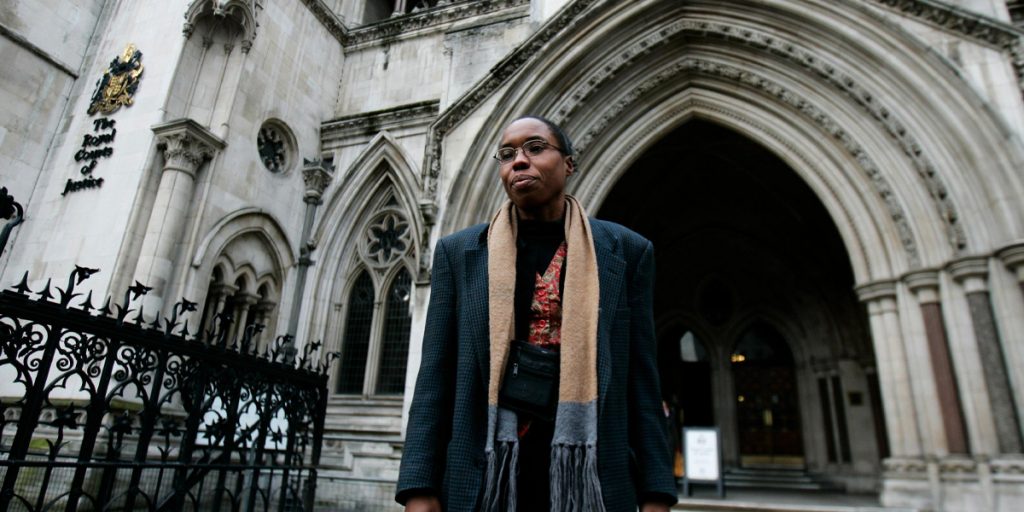Documentary We Are Not Ghouls chronicles military attorney Yvonne Bradley’s attempts to uncover a corrupt system, and inspires us to stand up for what we believe in.
What if you were a UK citizen who happened to be in Afghanistan when 9/11 took place, and you went to the airport to try and get back to your country but ended up getting arrested instead? And what if that arrest was followed by your request for a lawyer being denied, replaced instead by countless FBI and British intelligente interrogations while being moved from prison to prison, eventually ending up first at a CIA black site and then at Guantanamo Bay?
These are the questions director Chris James Thompson (The Jeffrey Dahmer Files) asks you to consider in We Are Not Ghouls, a documentary based on Jonathan Hafetz and Mark P. Denbeaux’s 2009 book “The Guantanamo Lawyers: Inside a Prison Outside the Law” and chronicling the efforts of US Air Force JAG Attorney Yvonne Bradley to defend an innocent man who was held at the infamous detention camp for the only “crime” of having found himself in the wrong place at the wrong time.
We’ve seen many films about Guantanamo, including more than one recent release, from Alex Gibney’s documentary Surviving Guantanamo Bay, which told the story of “forever prisoner” Abu Zubaydah (who’s also referenced in We Are Not Ghouls) to fictional retellings such as Scott Z. Burns’s The Report and Kevin Macdonald’s The Mauritanian, and even, in a way, Paul Schrader’s The Card Counter. What all these films have in common is that they shed light on the inhuman practices that took place at Guantanamo, a camp that was believed to hold “the worst of the worst” of war criminals, to use Yvonne Bradley’s words, but where inhuman and degrading physical and mental torture were employed that deprived detainees of the most basic human rights. With so many other movies about Guantanamo out there, did we need another documentary tackling the same issue? Considering that 750+ prisoners have been detained at Guantanamo since 9/11 and that it is still operating to this day, with 39 prisoners currently remaining at the camp, the answer is yes.
In fact, there’s a lot more that makes We Are Not Ghouls stand out from other films revolving around this subject, starting from how director Chris James Thompson chose to focus not on the ways in which prisoners were tortured in Guantanamo but mainly on Yvonne Bradley, the military attorney who volunteered to defend a detainee who was facing a death penalty case in 2005. Bradley eventually uncovered a case of systemic corruption that went beyond what she could have imagined, and spent four years fighting not only to grant the prisoner in question (and many more) a fair trial, but also to make as many people as possible aware of a corrupt system that favoured results over justice, depriving innocent men of their humanity to an extent that they ended up confessing to crimes that they hadn’t committed just to make the torture stop.
We Are Not Ghouls focuses on one man in particular, Binyam Mohamed, one of the first ten individuals to be tried by a military commission. Binyam faced a death penalty case for conspiracy to commit terrorist acts against the USA, and his case was assigned to Yvonne in 2005. From the very beginning of the film, it’s the attorney herself who tells us about her experience of going to Guantanamo to meet the inmate for the first time, together with civilian defense attorney Clive Stafford Smith, and listening to his story only to find out that there was something not quite right with the charges. From there, Yvonne’s investigation begins, and the documentary takes us through every single step of her journey, from alleged “co-conspirators” who didn’t even know each other to flights that disappeared, radioactive devices that couldn’t possibly have been invented, and “alternative set of interrogation procedures” that involved painful razor cuts, mind games, confinement boxes, waterboarding, loud music, and environments set up to “make [people] crazy.”
We Are Not Ghouls can get a little preachy at times, mainly due to the many montages showing the media coverage at the time, from President Obama admitting that mistakes were made to a soldier jokingly telling reporters that “all that we can say with certainty is that none of these people are on our side,” and George W. Bush saying things such as “if anybody harbors a terrorist, you’re a terrorist,” and “terrorists that occupied Afghanistan now occupy cells at Guantanamo Bay” to cheering crowds. Though these clips serve to reinforce the film’s message that the image that came across from the media didn’t reflect reality, they feel a little redundant and even superfluous, since this message was already clear from Yvonne and Binyam’s recollections.
That said, We Are Not Ghouls is still a poignant documentary that shines when it lets its subjects take centre stage, and doesn’t forget to include accounts from other “players” – from other defense attorneys to CIA officers who share what little they can – who are often introduced as pieces of a playing cards set, which makes the film even easier to follow. The visual cues certainly help make the documentary more dynamic, especially when we hear audio interviews with Binyam, and other devices are employed to ensure a pretty complex story is always told in a way that’s straightforward enough for viewers to be able to follow it, regardless of how much or how little they know about these events. Ultimately, We Are Not Ghouls reminds us of the importance of having a fair system and inspires us to stand up for what we believe in, even if it takes months or even years to see real change.
We Are Not Ghouls premiered at SXSW 2022 on March 12, 2022 and is now available to watch on digital and on demand.

